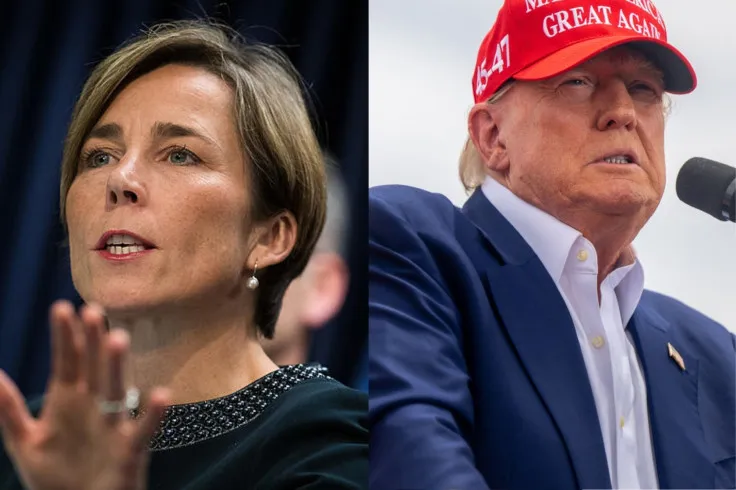Massachusetts Governor Maura Healey has issued a clear message for those who believe the state provides sanctuary to undocumented immigrants.
“Let me be clear to everyone: there is no such thing as a sanctuary state,” Healey stated in a year-end interview reported by CBS Boston.
This statement marks a significant departure from her previous positions, where she had vowed to defend immigrant communities against harassment from the Trump administration. Healey had even directed state police to refrain from cooperating with federal authorities on mass deportations.
In her interview with WBZ-TV, Healey discussed immigration concerns, clarified Massachusetts’ stance on so-called sanctuary policies, and addressed broader issues such as healthcare and Democratic priorities following Donald Trump’s re-election in 2024.
Massachusetts Rejects the “Sanctuary State” Label
During the interview, Healey unequivocally stated that Massachusetts does not offer special protections to undocumented immigrants. She cited policy changes made by her administration, which she claimed have reduced the number of immigrants choosing to relocate to the state.
“We’re not a sanctuary state. If you come here, there’s no housing available, and I think that’s been effective in influencing the flow of immigrants,” Healey told WBZ-TV, as reported by CBS Boston.
This approach stands in stark contrast to Massachusetts’ reputation as a welcoming state for immigrants.
Following the lead of New York City Mayor Eric Adams and other Democratic leaders, Healey appears to acknowledge the political shift represented by Trump’s election victory. By aligning aspects of her immigration stance with Trump’s hardline policies—such as the proposed mass deportations—Healey signals a pragmatic recalibration.
A former Massachusetts attorney general, Healey expressed skepticism about the utility of the “sanctuary” label, pointing out that law enforcement already collaborates across local, state, and federal levels for major criminal investigations.
“I don’t really understand what this terminology means in practice,” Healey said. “In serious criminal cases—drug trafficking, arms trafficking, human trafficking—local, state, and federal authorities already work together.”
Support Programs for Immigrants Significantly Reduced
Massachusetts has long been perceived as a safe haven for undocumented immigrants, with various support programs in place, including housing assistance, food aid, and specialized care for pregnant women. However, under the Healey-Driscoll administration, many of these initiatives have been scaled back or eliminated entirely.
Healey herself has lauded efforts to restrict access to housing for immigrants, arguing that such measures have alleviated strain on state resources and discouraged new arrivals. “This has contributed to a decline in the number of immigrants choosing Massachusetts as their destination,” she remarked in her WBZ-TV interview.
Additionally, Healey called on Congress and the Trump administration to revisit immigration reform and strengthen border security. She emphasized that systemic immigration challenges can only be effectively addressed at the federal level.
Broader Topics Addressed in the Interview
Beyond immigration, Healey discussed other pressing issues, including the closure of Stewart Hospital and the lessons learned from Donald Trump’s re-election.
Reflecting on the Democrats’ losses in the 2024 presidential race, Healey highlighted her party’s failure to connect with voters on economic issues, particularly those affecting middle- and working-class Americans.
“Democrats haven’t done enough to address Americans’ financial concerns,” she said. Healey pointed to her administration’s efforts to cut taxes, make higher education more affordable, and address housing affordability.
“We’ve reduced costs, lowered taxes, and made community colleges more accessible,” she explained, while also noting initiatives to support small businesses and entrepreneurs.
Access to affordable housing, Healey stressed, remains a top priority. “We need to bring down housing costs. Democrats need to focus on this issue and ensure that message resonates with voters,” she told WBZ-TV.
Trump’s Victory Sparks Policy Shifts
Since Donald Trump’s victory in the November 2024 presidential election—where he secured both the electoral and popular votes—several Democratic leaders have begun re-evaluating their stances on issues like immigration and the economy.
Trump’s win is widely seen as a mandate from the American people to address these challenges head-on.
Immigrant rights activists should brace themselves for the loss of key allies within the Democratic Party, particularly as leaders pivot toward more centrist positions.
Without the support of traditionally pro-immigrant Democratic leaders, the situation for undocumented immigrants may grow increasingly precarious during Trump’s second term. Healey’s comments serve as a stark reminder that immigrant communities cannot rely solely on Democratic leadership during this challenging period.
Haitians Among Largest Immigrant Communities in Massachusetts
Massachusetts ranks as the third most popular destination for Haitian immigrants, following Florida and New York. Haitians also form one of the state’s largest immigrant communities, particularly in cities like Boston, Cambridge, Brockton, Randolph, Everett, and Malden.
Sources: CBS Boston and WBZ-TV







